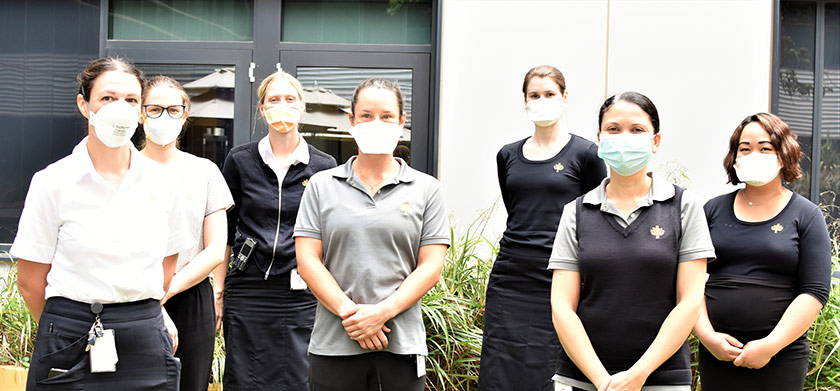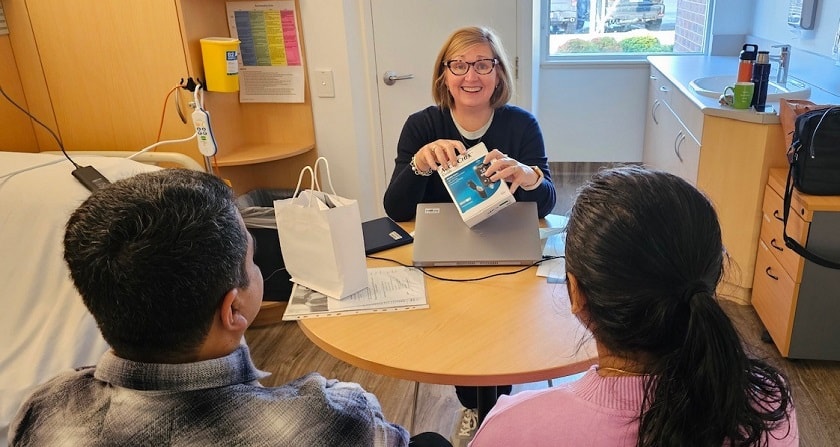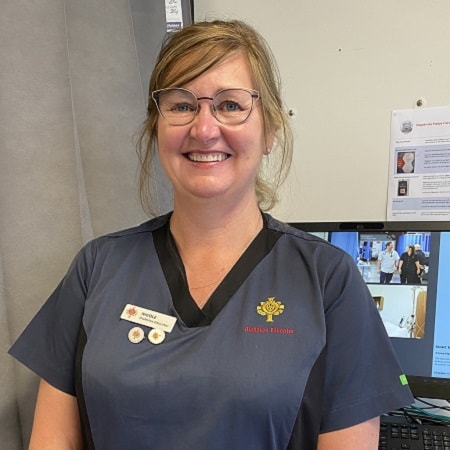
Lots of people think dietitians mostly focus on weight loss, are there other things you do for patients beyond this?
Contrary to what people think, the role of a dietitian in a hospital is to provide nutrition support to manage or prevent malnutrition – to help people maintain or put on weight.
Patients in hospital may have higher energy and nutritional needs due to their illness so when we help them maintain or gain weight they become stronger.
Dietitians work closely with patients and consider their personal, cultural, and spiritual needs whilst liaising closely with the treating doctors to ensure nutrition provision is safe based on the patient’s medical needs.
Some ways we can provide nutrition support include:
- Estimating nutrient requirements for those who cannot eat enough orally and need to be fed via a feeding tube. We recommend the type of product, method and rate as well as assess their tolerance. We also ensure patients are able to safely and confidently give feeds so they can continue them at home if needed.
- Some patients are unable to have any food or fluid through their gut and therefore need all of their nutrition to be delivered through their veins. We assess the nutrient requirements for these patients and recommend total parenteral nutrition (TPN).
- Prescribing oral nutrition supplements for people who are not able to eat enough to maintain their weight or muscle mass.
- Prescribing a high protein and energy diet for people with poor appetite, malnutrition or increased nutrition requirements due to medical conditions.
- Helping people with diabetes manage their blood glucose levels through providing education and counselling on foods that impact blood glucose levels including patients who take insulin.
What type of conditions do you help people manage?
A dietitian can help with a wide range of conditions. Some of these include:
- Kidney disease – patients may require counselling and education on a low salt, low potassium and/or low phosphate diet.
- Most types of cancers – patients may lose weight, have a very poor appetite, or find it too painful to eat or drink. All of these things can be managed with support from a dietitian.
- Inflammatory bowel disease (IBD) – a dietitian can work with patients to identify foods that worsen symptoms or provide education and support for nutrient deficiencies or unintentional weight loss.
- Gastrointestinal surgeries or conditions– patients may not be able to have any food or fluid through their gut and need to get all their nutrition through their veins until their gut has rested or been repaired.
- Malnutrition – patients require support to increase energy and protein in their diet to prevent further weight loss and aim for increased weight and muscle mass.
- Children with multiple allergies – require support to meet their nutrition requirements for growth.
- Children struggling to grow – a dietitian advises on special recipes for fortified breast milk or formula and also provides education about optimising diet for children who eat solids.
- Swallowing difficulties - patients may require feeding through a tube or support getting enough nutrition if they are on thickened fluids or a texture modified diet.
How do you influence food, meals and other areas of nutrition support in hospital?
Dietitians are involved with auditing and assessing the hospital menu against Nutrition Standards. We also monitor and advise on food allergy management relating to food products and the various systems used in the hospital, as well as reviewing therapeutic diets such as the low potassium diets for kidney disease.
Dietitians work as a team to constantly develop and improve policies and procedures so patients receive timely and safe dietetic care.
We also have to be adaptable during periods of supply shortages in order to ensure that options of nutrition support such as oral nutrition supplements and tube feeding alternatives are always available for our patients.
In addition to this, we provide education to other health professionals to increase awareness on nutrition related topics and caring for patients at nutrition risk. This could relate to food allergy management or monitoring and caring for those who require additional nutrition support such as patients with eating disorders, cancer or kidney disease.
What role do you think dietitians play in improving the patient experience in hospital?
Throughout the year multidisciplinary meal taste audits are carried out. This involves a consumer and representatives from dietetics, speech pathology, nursing and catering meeting to taste and rate various hospital meals and products. Feedback and comments are collated and changes are made according to this with the aim to improve the patient mealtime experience.Finish this sentence: Without dietitians, patients in hospital wouldn’t…
meet their nutritional needs which will impact their recovery.
What is one thing you wish people know about dietitians?
Dietitians are university qualified nutrition experts that undertake a three year Bachelor of Science with a further one to two years of Postgraduate or Masters study in Dietetics. In hospital, all dietitians are either Accredited Practising Dietitians or Advanced Accredited Practising Dietitians.
We do not judge a person for what they eat. We work with people so they can make informed choices about the foods they eat to benefit their medical condition or background as much as possible. We use counselling skills to help people make positive changes for their health or to troubleshoot barriers to making change.
Thanks to Claire Coxon, Accredited Practising Dietitian at St John of God Midland Public and Private Hospitals for her contributions to this article alongside Tammy. Claire is currently working as an Accredited Practising Dietitian in the areas of general surgery, general medicine and paediatrics. Her qualifications include a Bachelor of Science (Nutrition and Food Science) and a Postgraduate Masters (Dietetics).






